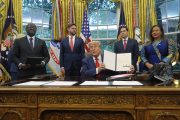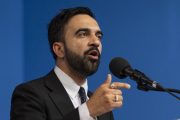
Minnesota Governor and Democratic vice-presidential candidate Tim Walz took the stage at a California fundraiser on Tuesday to proclaim that the Electoral College “needs to go.”
As reported by CNN:
“I think all of us know the Electoral College needs to go. We need, we need [a] national popular vote, but that’s not the world we live in. So we need to win Beaver County, Pennsylvania. We need to be able to go into York, Pennsylvania, win. We need to be in western Wisconsin and win. We need to be in Reno, Nevada, and win,” the Democratic vice presidential nominee told supporters gathered at Gov. Gavin Newsom’s private residence in Sacramento, according to the pool report.
The report adds that the Harris campaign swiftly backtracked Walz’s lamentations. In a provided statement, they emphasized that Walz actually believes that “every vote matters in the Electoral College.” They also portrayed his travels through battleground states as a noble quest to secure the necessary 270 electoral votes. In his remarks, Walz was merely “[commending and] thanking [the donors] for their support that is helping fund those efforts,” added the campaign.
According to Politico, Walz made similar comments at a fundraiser in Seattle earlier that same day.
The Harris-Walz Record
CNN reminded readers that Vice President and Democratic presidential candidate Kamala Harris has previously shown interest in discussing the potential abolition of the Electoral College. During a 2019 interview, while running for president, Harris stated she was “open to the discussion,” noting that the popular vote has lost its significance in determining the presidency.
According to The New York Times, Walz has previously shown support for moving away from the current voting system in favor of a popular vote. Last year, as governor, he signed legislation that added Minnesota to the National Popular Vote Interstate Compact, an agreement in which states pledge to award their electoral votes to the national popular vote winner. The outlet called the agreement “an end run on the Constitution” allowing “states to skirt the Electoral College.”
Just recently, at a fundraiser in New York hosted by investor Alex Soros and former Clinton staffer Huma Abedin, Walz reiterated his criticism of the Electoral College. According to Politico, during the event he expressed “hope for the country,” but emphasized his “pragmatic” understanding of the system. Acknowledging the close nature of swing states, Walz noted that while he supports a shift to a national popular vote, he and Vice President Harris remain focused on “the energy” and momentum in critical battleground states under the current electoral framework.
Frustration With Federalism
Walz’s frustration with the Electoral College is evident. He has to appeal to small towns and rural areas such as Beaver County, Pennsylvania, and swing regions in Wisconsin and Nevada. Representing a mix of rural, industrial, and blue-collar workers, with diverse political leanings that can shift between elections, these voters often prioritize issues such as economic stability, job security, healthcare, and local industry support, particularly in regions affected by shifts in manufacturing and agriculture. Unlike voters in more urban, liberal-leaning areas, these communities often focus more on pragmatic concerns rather than broad ideological platforms.
Clearly, by advocating for the Electoral College’s elimination, Walz disregards a core principle of American republicanism — federalism. The Founders designed the Electoral College to protect the voices of smaller states and prevent densely populated urban areas from dominating elections. In The Federalist, No. 68, Alexander Hamilton argued that the system would avoid the risks of mob rule or fleeting passions, ensuring balanced decision-making in choosing the president.
Walz’s calls to dismantle the system might sound appealing to some, but they reveal a lack of appreciation for its purpose. Ironically, while his campaign is built on securing electoral votes, he critiques the very system that guarantees broad national representation. His rhetoric may be less about principled opposition and more about frustration over the inability to focus solely on “progressive” urban strongholds, particularly on the East and West Coasts.
Criticism
The Trump campaign took to X to criticize Walz’s outspoken calls to abolish the Electoral College. They sarcastically questioned why he “hate[s] the Constitution so much.”
Conservative commentator Charlie Kirk placed Walz’s call to abolish the Electoral College in a broader context of what he views as a Democratic agenda to overhaul foundational American institutions. In a tweet describing this push to reshape the country, Kirk listed propositions such as packing the Supreme Court, restricting free speech, enforcing mandatory gun confiscation, weakening U.S. citizenship benefits, abolishing the Senate filibuster, and adding Puerto Rico and Washington, D.C., as states.
Democrats’ Push to End the Electoral College
In recent years, Democrats have increasingly pushed to abolish the Electoral College, particularly following the 2000 and 2016 elections, where the popular-vote winner lost the presidency. The argument is that the system undermines the will of the majority by allowing a candidate to win without securing the most votes nationwide. Hillary Clinton, after losing to Donald Trump in 2016 despite (officially) winning the popular vote, called for the Electoral College’s abolition, saying it was outdated.
These efforts gained momentum in 2020 amid broader calls for electoral reform, with some critics linking the origins of the Electoral College to protecting the power of slaveholding states and racial inequality. Figures such as Stacey Abrams have also pointed out the system’s disproportionate impact on voters of color. Others, such as Senator Elizabeth Warren (D-Mass.), have argued that the Electoral College gives an outsized voice to smaller states at the expense of the majority.
Despite ongoing calls for change, maintaining the Electoral College remains essential for preserving the balance of political power across the United States. Efforts such as the National Popular Vote Interstate Compact, which seeks to award electoral votes to the national popular vote winner, have gained traction. However, any significant shift toward eliminating the Electoral College would require a constitutional amendment — a highly unlikely prospect in today’s polarized political environment.





